Press Releases
Euroseas Ltd. Reports Results for the Nine Months and Quarter Ended September 30, 2009
Maroussi, Athens, Greece - November 16, 2009 - Euroseas Ltd. (NASDAQ: ESEA), an owner and operator of drybulk and container carrier vessels and provider of seaborne transportation for drybulk and containerized cargoes, announced today its results for the three and nine month periods ended September 30, 2009.
Third Quarter 2009 Highlights:
- Net income of $2.2 million or $0.07 per share basic and diluted on total net revenues of $17.2 million. Excluding the effect of unrealized gain on derivatives, unrealized loss on trading securities and amortization of the fair value of charters acquired, the net loss for the period would have been $0.3 million, or $0.01 loss per share basic and diluted.
- Adjusted EBITDA was $5.0 million. Please refer to a subsequent section of this Press Release for a reconciliation of adjusted EBITDA to net income.
- An average of 16.79 vessels were owned and operated during the third quarter of 2009 earning an average time charter equivalent rate of $15,101 per day.
- Declared a quarterly dividend of $0.05 per share for the third quarter of 2009 payable on December 18, 2009 to shareholders of record on December 11, 2009. This is the seventeenth consecutive quarterly dividend declared.
First Nine Months 2009 Highlights:
- Net income of $0.7 million or $0.02 per share basic and diluted on total net revenues of $47.3 million. Excluding the effect of unrealized loss on derivatives, unrealized gain on trading securities and amortization of the fair value of charters acquired, the net income for the period would have been $2.1 million, or $0.07 per share basic and diluted.
- Adjusted EBITDA was $17.0 million. Please refer to a subsequent section of this Press Release for a reconciliation of adjusted EBITDA to net income.
- An average of 16.17 vessels were owned and operated during the first nine months of 2009 earning an average time charter equivalent rate of $13,632 per day.
- Declared three quarterly dividends for a total of $0.25 per share during the first nine months of 2009.
Aristides Pittas, Chairman and CEO of Euroseas commented: "During the third quarter of 2009 we took delivery of our third drybulk vessel for the year, The vessel came with a t/c attached at $25,200/day for 6 months and we subsequently re-chartered it for a further two years at $17,500 thus improving our earnings visibility. At the same time, we have been able to recharter all the containerships coming out of charter for varying firm periods of a few months to a year, albeit at rates slightly below operating costs. As a result our current charter coverage for 2010 is about 47%, without including optional periods, broken down as about 80% for our bulkers fleet and 29% for our containership fleet. Whilst we are skeptical about the outlook of the drybulk market for 2010 (hence our high charter coverage) we believe the container market has reached the bottom where it may stay for a while but eventually can only move upwards. Especially for vessels under 2000 teu, like ours, we expect the recovery to come sooner than for the larger vessels.
We intend to continue taking advantage of low vessel prices in any sector we can find them to further renew and expand our fleet. As the opportunities we see emerging seem very attractive, we have decided to preserve cash for future investments and decrease our dividend towards the lowest level of the range the Board considers satisfactory. Thus, our Board elected to declare a dividend of $0.05/share which still yields about 5% p.a. based on the recent levels of our stock price."
Tasos Aslidis, Chief Financial Officer of Euroseas commented: "The results of the third quarter of 2009, as expected, reflect the lower level of the charter markets compared to the same period a year ago. Our results were positively influenced by non-cash gains mainly on FFA contracts despite some non-cash losses on interest rate swaps.
Total daily vessel operating expenses, including management fees and general and administrative expenses, during the third quarter of 2009 reflect a decrease about 25% on a per vessel per day basis compared to the third quarter of 2008. Part of this decrease (about 11%) is due to the fact that three of our vessels were laid-up during the third quarter of 2009 and thus incurred significantly lower daily costs, but a significant part (about 14%) is associated with cost reductions. As always, cost control remains a key component of our strategy.
As of September 30, 2009, our net debt position was about $26.4 million with our outstanding debt at $79.1 million versus restricted and unrestricted cash of about $52.7 million. We continue to enjoy our bankers' support and have been able to finance all three of our vessel purchases this year with about 50% debt."
Third Quarter 2009 Results:
For the third quarter of 2009, the Company reported total net revenues of $17.2 million representing a 51.6% decrease over total net revenues of $35.5 million during the third quarter of 2008. The Company reported net income for the period of $2.2 million as compared to net income of $14.5 million for the third quarter of 2008. The results for the third quarter of 2009 include a $2.0 million net unrealized gain on derivatives and trading securities as compared to $1.1 million unrealized loss on derivatives and trading securities for the same period of 2008. Depreciation expenses for the third quarter of 2009 were $5.1 million compared to $7.8 million during the same period of 2008. The decline was due to a change in estimates (see below) and the sale of M/V Nikolaos P and M/V Ioanna P, which contributed $2.0 million to the depreciation expenses in the third quarter of 2008, partly balanced by the depreciation of three vessels purchased in 2009. On average, 16.79 vessels were owned and operated during the third quarter of 2009 earning an average time charter equivalent rate of $15,101 per day compared to 16 vessels in the same period of 2008 earning on average $25,951 per day. Three of the Company's containerships were laid-up throughout the third quarter of 2009.
Adjusted EBITDA for the third quarter of 2009 was $5.0 million, a 76.3% decrease from $21.2 million achieved during the third quarter of 2008. Please see below for Adjusted EBITDA reconciliation to net income and cash flow provided by operating activities.
Basic and diluted earnings per share for the third quarter of 2009 was $0.07, calculated on 30,628,410 and 30,700,820, respectively weighted average number of shares outstanding, respectively, compared to basic and diluted earnings per share of $0.47 for the third quarter of 2008, calculated on 30,476,135 and 30,551,315 weighted average number of shares outstanding, respectively.
Excluding the effect on the earnings for the quarter of the unrealized gain on derivatives, unrealized loss on trading securities and amortization of the fair value of time charter contracts acquired, the loss per share for the quarter ended September 30, 2009 would have been $0.01 per share basic and diluted, and for the quarter ended September 30, 2008 the earnings would have been $0.47 per share basic and diluted. Usually, security analysts do not include the above items in their published estimates of earnings per share.
First nine months 2009 Results:
For the first nine months of 2009, the Company reported total net revenues of $47.3 million representing a 53.9% decrease over total net revenues of $102.7 million during the first nine months of 2008. The Company reported net income for the period of $0.7 million as compared to net income of $43.7 million for the first nine months of 2008. The results for the first nine months of 2009 include a $2.5 million net unrealized loss on derivatives and trading securities as compared to a $0.7 million unrealized loss on derivatives and trading securities for the same period of 2008. Depreciation expenses for the first nine months of 2009 were $14.4 million compared to $22.6 million during the same period of 2008. The decline was due to a change in estimates (see below) and the sale of M/V Nikolaos P and M/V Ioanna P, which contributed $6.0 million to the depreciation expenses in the first nine months of 2008, partly balanced by the depreciation of three of the vessels purchased in 2009 that contributed to the depreciation expense for the first nine months. On average, 16.17 vessels were owned and operated during the first nine months of 2009 earning an average time charter equivalent rate of $13,632 per day compared to 15.48 vessels in the same period of 2008 earning on average $25,868 per day. One of the Company's vessels was laid up during the entire first nine months of 2009 and two more vessels were laid up for the second and third quarter of 2009.
Adjusted EBITDA for the first nine months of 2009 was $17.0 million, a 71.9% decrease from $60.6 million achieved during the first nine months of 2008. Please see below for Adjusted EBITDA reconciliation to net income and cash flow provided by operating activities.
Basic and diluted earnings per share for the first nine months of 2009 was $0.02, calculated on 30,593,401 basic and 30,642,954 diluted weighted average number of shares outstanding, respectively,compared to basic and diluted earnings per share of $1.44 and $1.43 per share, respectively, for the first nine months of 2008, calculated on 30,409,078 and 30,555,095 weighted average number of shares outstanding, respectively.
Excluding the effect on the earnings for the first nine months of 2009 of the unrealized loss on derivatives, unrealized gain on trading securities and amortization of the fair value of time charter contracts acquired, the earnings per share for the nine-month period ended September 30, 2009 would have been $0.07 per share basic and diluted, and for the same period in 2008, would have been $1.27 and $1.26 per share basic and diluted, respectively. Usually, security analysts do not include the above items in their published estimates of earnings per share.
Change in accounting principle and change in estimates:
Beginning with the first quarter of 2009, the Company changed its accounting policy of drydocking costs from the deferral method, under which the Company amortized drydocking costs over the estimated period of benefit between drydockings, to the direct expense method, under which the Company expenses all drydocking costs as incurred. The Company believes that the direct expense method is preferable as it eliminates the significant amount of time and subjectivity involved in determining which costs and activities related to drydocking qualify for the deferral method. When the accounting principle was retrospectively applied, net income for the three month and for the nine month periods ended September 30, 2008 decreased by $0.9 and $2.5 million, respectively, or, $0.03 and $0.08 per share, respectively, basic and diluted.
The Company reflected this change as a change in accounting principle from an accepted accounting principle to a preferable accounting principle in accordance with FASB ASC 250-10 Accounting Changes and Error Corrections. The new accounting principle will be applied retrospectively to all periods presented in earnings releases and filings.
During the fourth quarter of 2008, the Company also changed its estimates of the scrap price and useful life of its containerships to better reflect the present market environment, industry practice and intended use. The effect of these changes increased net income for the three and nine month periods ended September 30, 2009 by $1.6 and $4.8 million, respectively, or $0.05 and $0.16 per share, respectively, basic and diluted.
Fleet Profile:
The Euroseas Ltd. fleet profile is as follows:
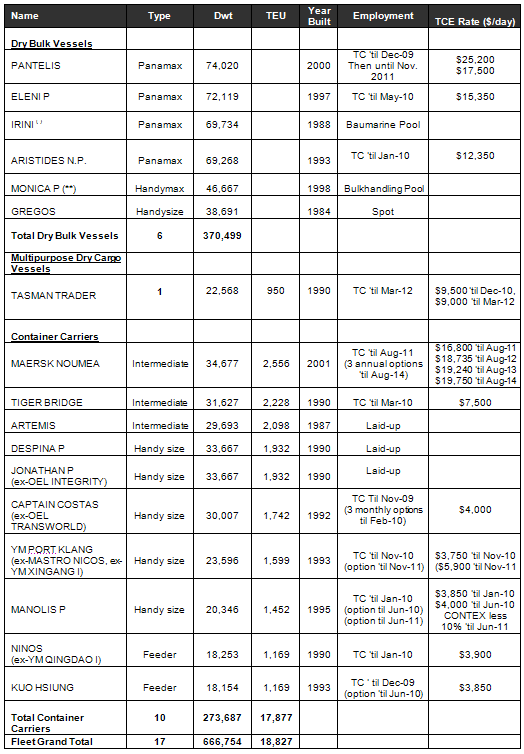
Note: TC denotes time charter. All dates listed are the earliest redelivery dates under each TC. All extension option are in favour of the charterers.
(*) "Irini" is employed in the Baumarine spot pool that is managed by Klaveness, a major global charterer in the drybulk market.
(**) "Monica P" is employed in the Bulkhandling spot pool that is also managed by Klaveness.
New charter arrangements:
"YM Port Klang" (ex-"Mastro Nicos", ex-"YM Xingang I") entered into an approximately one year time charter agreement at a gross daily rate of $3,750 per day. The charterer has the option to extend the charter for one additional year at a gross daily rate of $5,900 per day. Upon delivery to new charterers the vessel was renamed "YM Port Klang".
"Manolis P" entered into a time charter agreement ranging from a three to six month period at a gross daily rate of $3,850 per day with an option of the charterer to extend it for another five to seven months at a gross daily rate of $4,000 per day and upon completion of that optional period the charterer has another option to further extend the charter for one more year at a rate based on the 1,700 TEU Container Index (CONTEX) minus 10%.
"Ninos" was re-delivered early from its previous charter and was chartered at the rate shown.
Approximately 80% of Euroseas' total fleet days for the remaining days of 2009 and approximately 47% in 2010 are secured under period charters or Forward Freight Agreements (FFAs) not including the extension options held by charterers.
Summary Fleet Data:
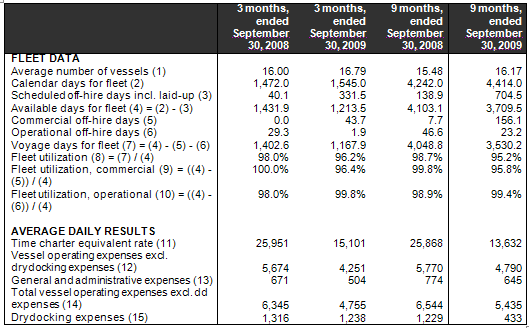
(1) Average number of vessels is the number of vessels that constituted our fleet for the relevant period, as measured by the sum of the number of calendar days each vessel was a part of our fleet during the period divided by the number of calendar days in that period.
(2) Calendar days. We define calendar days as the total number of days in a period during which each vessel in our fleet was in our possession including off-hire days associated with major repairs, drydockings or special or intermediate surveys or days of vessels in lay-up. Calendar days are an indicator of the size of our fleet over a period and affect both the amount of revenues and the amount of expenses that we record during that period.
(3) The scheduled off-hire days including vessels laid-up are days associated with scheduled repairs, drydockings or special or intermediate surveys or days of vessels in lay-up. The shipping industry uses available days to measure the number of days in a period during which vessels were available to generate revenues.
(4) Available days. We define available days as the total number of days in a period during which each vessel in our fleet was in our possession net of scheduled off-hire days including days of vessels laid-up.
(5) Commercial off-hire days. We define commercial off-hire days as days waiting to find employment.
(6) Operational off-hire days. We define operational off-hire days as days associated with unscheduled repairs or other off-hire time related to the operation of the vessels.
(7) Voyage days. We define voyage days as the total number of days in a period during which each vessel in our fleet was in our possession net of commercial and operational off-hire days. The shipping industry uses voyage days to measure the number of days in a period during which vessels actually generate revenues.
(8) Fleet utilization. We calculate fleet utilization by dividing the number of our voyage days during a period by the number of our available days during that period. The shipping industry uses fleet utilization to measure a company's efficiency in finding suitable employment for its vessels and minimizing the amount of days that its vessels are off-hire for reasons such as unscheduled repairs or days waiting to find employment.
(9) Fleet utilization, commercial. We calculate commercial fleet utilization by dividing our available days net of commercial off-hire days during a period by our available days during that period.
(10) Fleet utilization, operational. We calculate operational fleet utilization by dividing our available net of operational off-hire days during a period by our available days during that period.
(11) Time charter equivalent, or TCE, is a measure of the average daily revenue performance of a vessel on a per voyage basis. Our method of calculating TCE is consistent with industry standards and is determined by dividing revenue generated from voyage charters net of voyage expenses by available days for the relevant time period. Voyage expenses primarily consist of port, canal and fuel costs that are unique to a particular voyage, which would otherwise be paid by the charterer under a time charter contract, as well as commissions. TCE is a standard shipping industry performance measure used primarily to compare period-to-period changes in a shipping company's performance despite changes in the mix of charter types (i.e., spot voyage charters, time charters and bareboat charters) under which the vessels may be employed between the periods.
(12) Daily vessel operating expenses, which include crew costs, provisions, deck and engine stores, lubricating oil, insurance, maintenance and repairs and management fees are calculated by dividing vessel operating expenses by fleet calendar days for the relevant time period. Drydocking expenses are reported separately.
(13) Daily general and administrative expense is calculated by dividing general and administrative expense by fleet calendar days for the relevant time period.
(14) Total vessel operating expenses, or TVOE, is a measure of our total expenses associated with operating our vessels excluding drydocking expenses. TVOE is the sum of vessel operating expenses and general and administrative expenses. Daily TVOE is calculated by dividing TVOE by fleet calendar days for the relevant time period.
(15) Drydocking expenses, which include expenses during drydockings that would been capitalized and amortized under the deferral method divided by the fleet calendar days for the relevant period. Drydocking expenses could vary substantially from period to period depending on how many vessels underwent drydocking during the period.
Conference Call and Webcast:
Today, Monday, November 16, 2009 at 11:00 a.m. EDT, the company's management will host a conference call to discuss the results.
Conference Call details:
Participants should dial into the call 10 minutes before the scheduled time using the following numbers: 1 866 819 7111 (from the US), 0800 953 0329 (from the UK) or +44 (0)1452 542 301 (international standard dial in). Please quote "Euroseas".
In case of any problems with the above numbers, please dial 1 866 223 0615 (from the US), 0800 694 1503 (from the UK) or +44 (0)1452 586 513 (international standard dial in). Quote "Euroseas".
A recording of the conference call will be available until November 23, 2009 by dialing 1 866 247 4222 (from the US), 0800 953 1533 (from the UK) or +44 (0)1452 550 000 (international standard dial in). Access Code: 6973591#
Audio webcast - Slides Presentation:
There will be a live and then archived audio webcast of the conference call, via the internet through the Euroseas website (www.euroseas.gr). Participants to the live webcast should register on the website approximately 10 minutes prior to the start of the webcast. A slide presentation on the third quarter and first nine months 2009 results in PDF format will also be available 30 minutes prior to the conference call and webcast accessible on the company's website (www.euroseas.gr) on the webcast page. Participants to the webcast can download the PDF presentation.
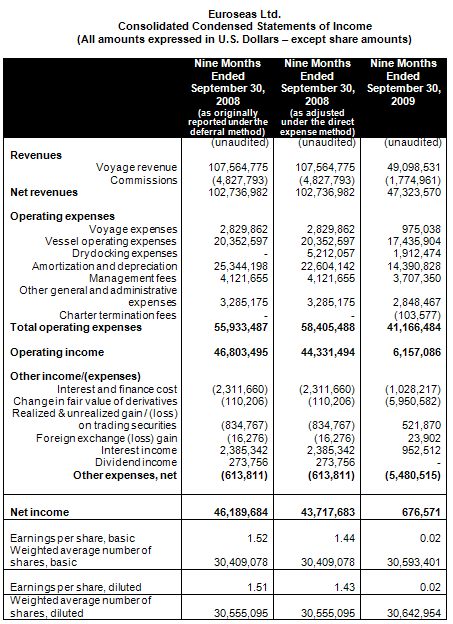
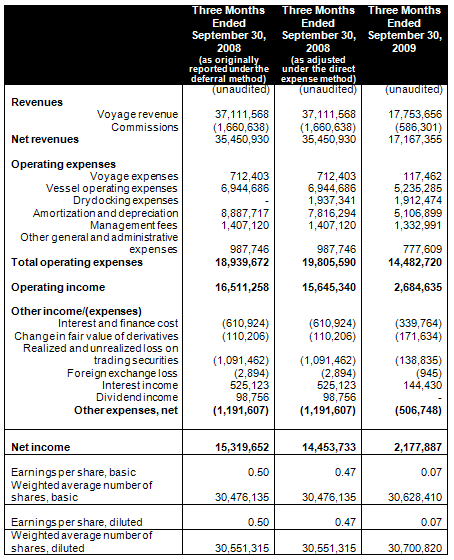
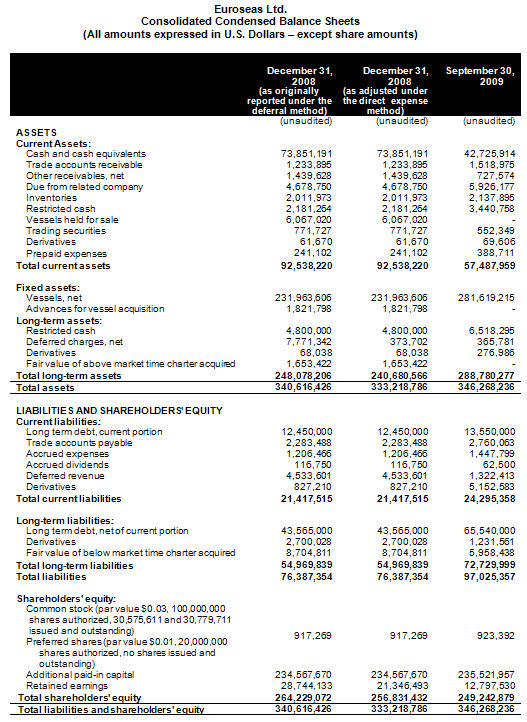
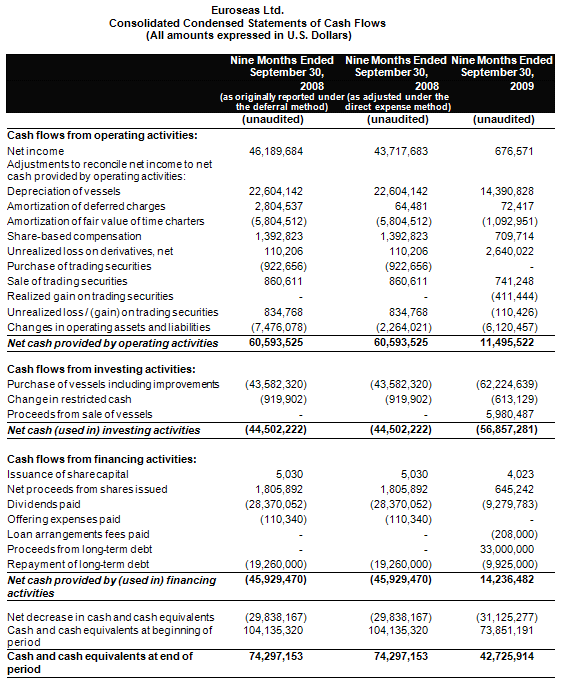
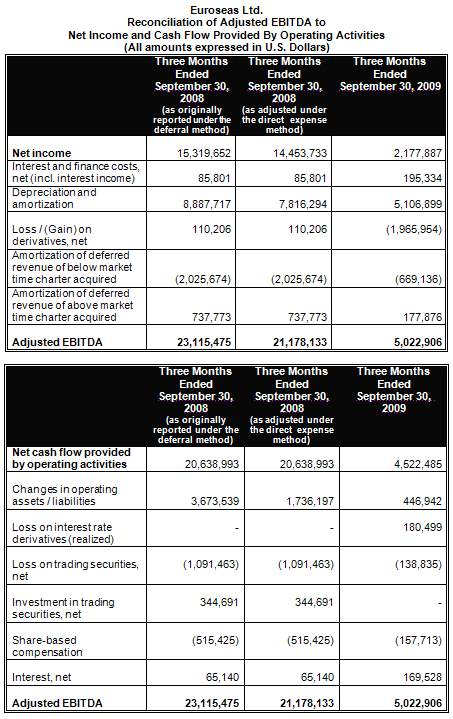
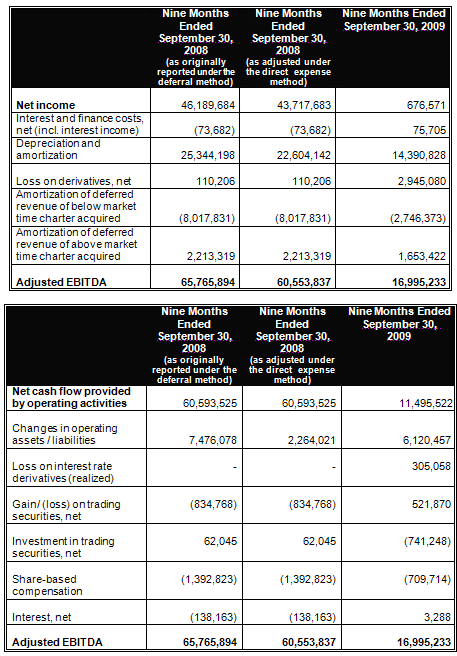
EBITDA Reconciliation:
Euroseas Ltd. considers Adjusted EBITDA to represent net earnings before interest, income taxes, depreciation, amortization, (gain)/loss in derivatives and amortization of deferred revenues from above or below market time charters acquired. Adjusted EBITDA does not represent and should not be considered as an alternative to net income or cash flow from operations, as determined by United States generally accepted accounting principles, or U.S. GAAP, and our calculation of Adjusted EBITDA may not be comparable to that reported by other companies. Adjusted EBITDA is included herein because it is a basis upon which we assess our financial performance and liquidity position and because we believe that it presents useful information to investors regarding a company's ability to service and/or incur indebtedness. The Company's definition of Adjusted EBITDA may not be the same as that used by other companies in the shipping or other industries.
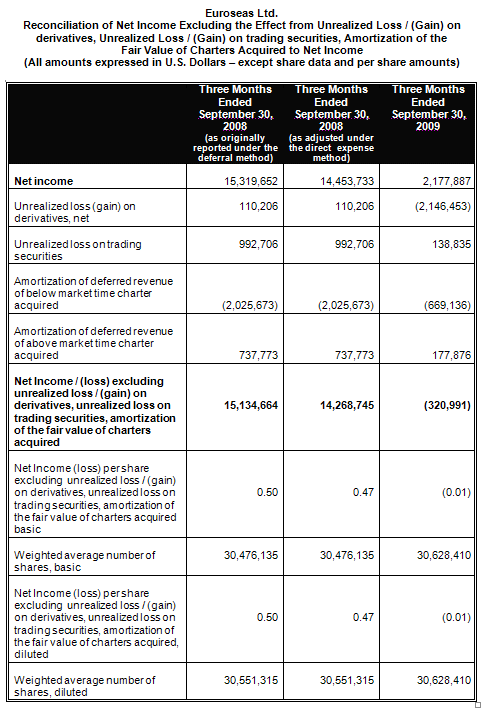
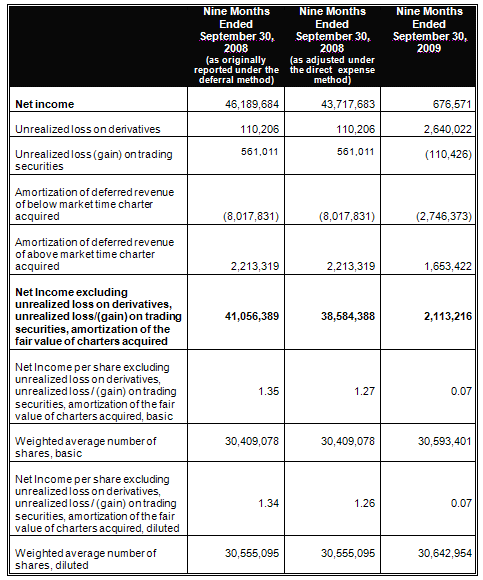
About Euroseas Ltd.
Euroseas Ltd. was formed on May 5, 2005 under the laws of the Republic of the Marshall Islands to consolidate the ship owning interests of the Pittas family of Athens, Greece, which has been in the shipping business over the past 136 years. Euroseas trades on the NASDAQ Global Select Market under the ticker ESEA.
Euroseas operates in the dry cargo, drybulk and container shipping markets. Euroseas' operations are managed by Eurobulk Ltd., an ISO 9001:2000 certified affiliated ship management company, which is responsible for the day-to-day commercial and technical management and operations of the vessels. Euroseas employs its vessels on spot and period charters and through pool arrangements.
The Company has a fleet of 17 vessels, including 4 Panamax drybulk carriers, 1 Handymax and 1 Handysize drybulk carriers, 3 Intermediate container ship, 5 Handysize container ships, 2 Feeder container ships and a multipurpose dry cargo vessel. Euroseas` 6 drybulk carriers have a total cargo capacity of 370,499 dwt, its 10 container ships have a cargo capacity of 17,877 teu and its 1 multipurpose vessel has a cargo capacity of 22,568 dwt or 950 teu.
Forward Looking Statement
This press release contains forward-looking statements (as defined in Section 27A of the Securities Act of 1933, as amended, and Section 21E of the Securities Exchange Act of 1934, as amended) concerning future events and the Company's growth strategy and measures to implement such strategy; including expected vessel acquisitions and entering into further time charters. Words such as "expects," "intends," "plans," "believes," "anticipates," "hopes," "estimates," and variations of such words and similar expressions are intended to identify forward-looking statements. Although the Company believes that the expectations reflected in such forward-looking statements are reasonable, no assurance can be given that such expectations will prove to have been correct. These statements involve known and unknown risks and are based upon a number of assumptions and estimates that are inherently subject to significant uncertainties and contingencies, many of which are beyond the control of the Company. Actual results may differ materially from those expressed or implied by such forward-looking statements. Factors that could cause actual results to differ materially include, but are not limited to changes in the demand for dry bulk vessels and container ships, competitive factors in the market in which the Company operates; risks associated with operations outside the United States; and other factors listed from time to time in the Company's filings with the Securities and Exchange Commission. The Company expressly disclaims any obligations or undertaking to release publicly any updates or revisions to any forward-looking statements contained herein to reflect any change in the Company's expectations with respect thereto or any change in events, conditions or circumstances on which any statement is based.
Visit our website www.euroseas.gr
Company Contact
Tasos Aslidis
Chief Financial Officer
Euroseas Ltd.
11 Canterbury Lane,
Watchung, NJ 07069
Tel. (908) 301-9091
E-mail: aha@euroseas.gr
Investor Relations / Financial Media
Nicolas Bornozis
President
Capital Link, Inc.
230 Park Avenue, Suite 1536
New York, NY 10169
Tel. (212) 661-7566
E-mail: euroseas@capitallink.com
